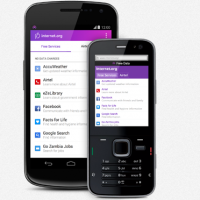Is Facebook's Free Internet Initiative Really an Altruistic Endeavor?

Facebook recently launched the Internet.org app in Zambia, which gives users free access to basic services, including Facebook, Google Search, Wikipedia, some job sites, and the Women's Human Rights app. Internet.org became reality via Facebook's partnership with the local carrier Airtel and will be offered in other developing countries. This certainly has the makings of a great initiative, but it also raises the question: Is it just a philanthropic venture or is there more to it than meets the eye?
During the launch Mark Zuckerberg said, "We believe that every person should have access to free basic internet services - tools for health, education, jobs and basic communication." And earlier in the year at Mobile World Congress, Zuckerberg mentioned, “Internet.org doesn’t just want to make access to the mobile internet cheap in the developing world. It wants to make baseline connectivity free."
These statements and the subsequent launch in Zambia make it seem that this is simply an initiative with the goal of connecting people and helping them leverage the benefits of the Internet. The fact that 85 percent of the 5 billion people without Internet simply can’t afford data plans really warrants that such initiatives be undertaken for the benefit of everyone.
On the other hand, such an initiative also raises some questions that deserve answers.
Who decides which basic services should be offered for free?
In this case, it’s Facebook and its allies. It was interesting to see Google Search listed in the offering, but there’s no mention of Twitter.
What do mobile carriers stand to gain if the Internet is offered for free?
Apparently, Airtel pays for the free access, but there is a catch. If someone uses Google Search and is shown a link outside the basic offered services, he will need to buy an upgraded data plan to access the page. So, there is a revenue angle to this program.
Who will be the users of this initiative?
In a developing world, there are broadly two types of users: those who are entirely new to the web and those who understand the web's potential but cannot afford a data plan. In either case, people who access the Internet are likely to use it more in the future, which may pave the way for revenue opportunities for the services and the carrier.
What does Facebook stand to gain from this initiative?
In addition to earning goodwill by connecting the developing and developed nations in the same platform, Facebook could potentially become a monopolistic entity. David Meyer describes this service as a walled garden because people can be happy with predefined services, but it will be equally hard for them to find access to any rival service.
The increased user base that Facebook builds with this initiative augments its prime business model of earning revenue via targeted advertising. Arguably, there are perceived gains (beyond altruistic) for Facebook. But if it helps make the world a better place, then it is probably worth the effort.
What do you think?

